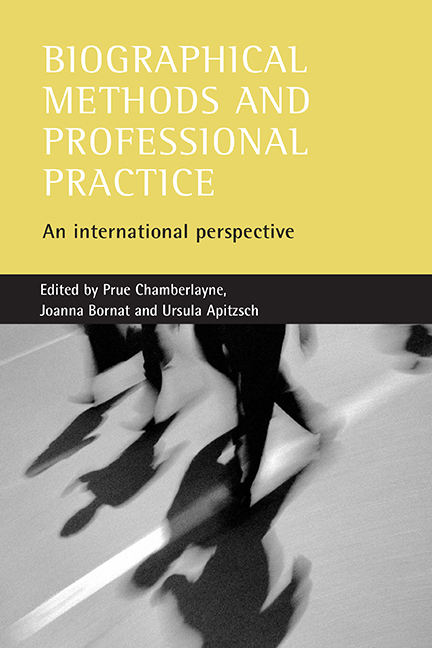Book contents
- Frontmatter
- Contents
- Notes on contributors
- one Introduction
- Part One Putting the subject into policy and practice
- Part Two Subjectivity in context
- Part Three Self-awareness in research and practice
- Part Four Recognising trajectories of disempowerment
- Part Five Biographical resources in education and training
- Index
twelve - Ethical aspects of biographical interviewing and analysis
Published online by Cambridge University Press: 20 January 2022
- Frontmatter
- Contents
- Notes on contributors
- one Introduction
- Part One Putting the subject into policy and practice
- Part Two Subjectivity in context
- Part Three Self-awareness in research and practice
- Part Four Recognising trajectories of disempowerment
- Part Five Biographical resources in education and training
- Index
Summary
It may seem obvious to say that biographical research differs from all other sociological research. The differences apply to research techniques, procedures of analysing biographical material and something that can be called a ‘style of work’, which covers the very time-consuming research stages of material collection and analysis. These and many other specific features of biographical research are grounded in theoretical and methodological assumptions which vary for particular types of biographical work. However, the outstanding characteristic of this kind of work is that the research material is biography.
Each biographical story is unique. The situation of its creation is not – and cannot be – standardised. This is what makes biographical work different from other, more traditional, techniques and applies especially to unprepared stories that are recounted and recorded in the presence of a researcher. Whereas biographical accounts that are written down can be changed and amended, narrative is the outcome of face-to-face interaction, which involves both a narrator and a researcher. It follows that the process of collecting narrated biographies and their subsequent analysis is related not only to particular methodological procedures, but also to a situational context and to different aspects of interpretation connected with the case of a given person who is not just a respondent in the research, and not just the anonymous author of a life story. Altogether, these circumstances may generate different sorts of questions: how valid are the accounts? How representative are they? Is it possible to make generalisations from the biographical analysis, as well as questions about ethical aspects of biographical interviewing?
This chapter concentrates on the latter issue. My comments will mostly concern the method of narrative biographical interview with which I work. In this type of interview, people are stimulated to tell the stories of experiences they have lived through (Schütze, 1983). A narrator is expected to give an extempore account of their life without being interrupted by the listener (researcher). The interview is recorded and then carefully transcribed. It is very important, therefore, to create an atmosphere that encourages the narrator to talk about their life. The researcher should stimulate the narration in such a way that the narrator can be sure that their personal story is what the researcher is interested in, and that the researcher is ready to listen to their experiences (Hermanns, 1987). The text of the interview is analysed according to the detailed procedure of narrative analysis.
- Type
- Chapter
- Information
- Biographical Methods and Professional PracticeAn International Perspective, pp. 181 - 192Publisher: Bristol University PressPrint publication year: 2004



